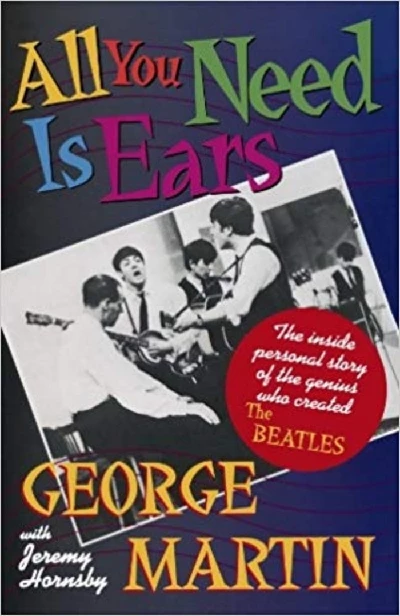published: 6 /
8 /
2019

Lisa Torem in 'Raging Pages' finds that George Martin’s memoir 'All You Need is Ears' remains as timeless as ever and is essential reading for all musicians.
Article
Producer George Martin’s early work included recording comedian/actor Peter Sellers as well as classical works. When he started his career in the 1950s, techies looked like laboratory assistants in their white coats and engineers enjoyed little status. Producers often took the role of A & R men, labored over orchestrations and grimaced over the grooves of chunky LPs. His work often took a comical turn as he struggled to create sophisticated sound effects on a skimpy budget.
In the early part of his memoir, Martin recounts being born during the depression. In about 1939, his college was evacuated to “Welwyn Garden City, a place I had never heard of…” Despite the transition, he fared well. He had strong roots, an honest father who loved wood working and a doting mother. He fell in love with a special instrument too, the piano.
His book is multi-dimensional, but because Martin is known by many as the producer of The Beatles, it’s often difficult to be a patient reader, as he describes his early days at EMI/Parlophone. The equipment was out-of-date compared to that of American companies and his expectations that positive team work and loyalty would be appreciated were often unmet.
But Martin was an extremely gifted professional and this is a book that offers much in the way of advice and introspection. For the lay person and the beginning technocrat, his descriptions of proper mike placement and how to create desirable acoustics in the studio is invaluable. He demystifies related vocabulary and offers plenty of examples of what can go miserably wrong and what can go incredibly right.
As a front-row observer of the Beatles, Martin tells some amazing stories, primarily about John Lennon and Paul McCartney; he pretty much disregards George Harrison and Ringo Starr and their contributions. He also admits that he never thought Pete Best could successfully cut it as the Beatles drummer.
What’s significant is how much Lennon and McCartney depended on Martin’s experience and expertise. Often times, because they lacked the appropriate vocabulary, one or the other would merely hum a quick melody and expect the producer to bring in a complete orchestra…
In one instance pertaining to the song, ‘Strawberry Fields Forever’ Lennon had recorded passages that were in two different keys and two different tempos. He thought about it and concluded that he liked them both, so he told Martin that he wished to join the two version together, clearly not anticipating any possible technical complexities.
“You can fix it, George,” Lennon casually surmised. Ultimately Martin came up with the goods, but not without tearing out his hair.
There are portions of the book, too, devoted to Martin’s dealings with other acts in his post-Beatles career, such as with the rock band America. In contrast, these sections feel like filler, but it is Martin’s appraisal of the changing cultural mores that invite rapid-fire turn paging.
His warring days with EMI/Parlophone, notwithstanding, Martin revealed himself as a true professional, a standup guy and a survivor of the highest order. This book will round out every music geek or lay person’s must-have library.
Finally, as ‘All You Need is Ears’ was published in 1979, it is especially interesting to note Martin’s then-reactions to the up and coming age of sophisticated, digital, music technology. Already armoured, after acquiring decades of studio battle scars, the famed producer appeared unscathed, curious and quite ready to forge ahead into the abyss. Perhaps his many admirers will also follow suit…
Band Links:-
http://www.georgemartinmusic.com
https://en.wikipedia.org/wiki/George_M
Play in YouTube:-